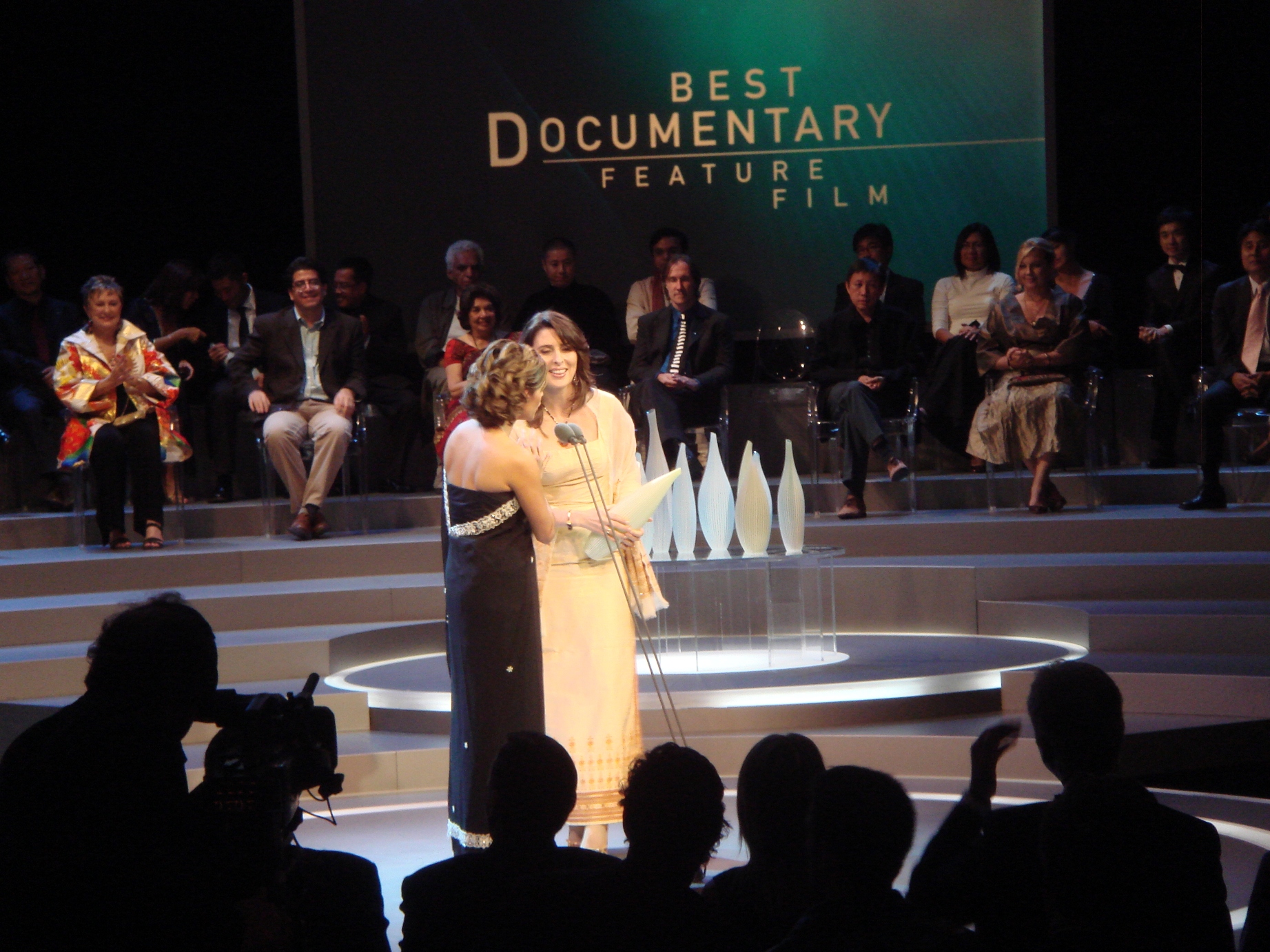By Neena Bhandari
Gold Coast (Australia), 16.12.2007 (IANS): Films exploring the lives of women in some of the most volatile situations won many an award at the inaugural Asia Pacific Screen Awards. APSA, the region’s highest accolade in film, showcased the immense talent and cinematic diversity of a region covering more than 70 countries, one-third of the earth’s surface, 60 per cent of its total population and half the world’s film output.
APSA brought together films from the classical and traditional to the experimental and cutting edge industries – from the stylised horror genres of Japan, to the allegorical tragedies and comedies of Korea; the extraordinary tapestry of Chinese cinema, the multifaceted industries of India, the poetry and reality of Persian cinema to the visionary narratives of the Middle East.
“One thing common is exploration of human spirit, experience and human relationships, making judging a pleasurable experience”, said acclaimed Indian actress and activist Shabana Azmi, who was the president of the first APSA jury.

The Best Documentary award was bagged by Beirut Diaries: Truth, Lies and Videos (Yaoumiyat Beirut: Hakaek wa Akatheeb). Through the story of a young woman from Beirut, the film produced by Palestinian filmmaker Mai Masari and her husband, Lebanese filmmaker Jean Chamoun, explores the role of young people in the critical transformations underway in Lebanon in the period extending from the assassination of Prime Minister Rafik Hariri to the massive Israeli offensive of July 2006.
Mai, dedicating the award to the Lebanese and Palestinian people, said “…who are going through most difficult times in their history. Cultural films have to put us on the map. It is very important not to lose culture and an event like this makes us appreciate each other’s culture. It is a continuation of my previous work…the human stories that never get told on news.”
Mai, who was 16 years old during the 1975 civil war in Lebanon, says “I have been exposed to conflicts, people living in refugee camps, vibrant student and cultural movements and questions of identity as despite being a Palestinian I am unable to live in Palestine. I found films as a medium through which I could portray realities and express myself and tell the stories about people around me. It also fulfilled my artistic cravings.”
A mother of two daughters, she studied film at University of California, Berkeley, and San Francisco State University. Her films focus on young people, humanity’s will to survive, and life and death situations. Together with her husband, she has produced a series of documentaries that have won more than 60 international awards.
The finalists were drawn from all over the Asia-Pacific region with 34 films nominated from 19 countries: Armenia, Australia, China, Egypt, India, Indonesia, Iran, Iraq, Israel, Japan, Kazakhstan, Kurdistan, Lebanon, Malaysia, Philippines, Republic of Korea, Russian Federation, Sri Lanka and Turkey.
The Best Feature Film award was won by Secret Sunshine (Miryang) from Republic of Korea, produced by Kim In-Soo, Lee Chang-Dong and Hanna Lee. When Shin-ae’s husband passes away in an automobile accident, she and her son relocate down south to her late husband’s hometown of Miryang. Despite her efforts to settle down in this unfamiliar and much too normal place, she finds that she can’t quite fit in. She opens a new piano academy and makes attempts to mingle with neighbors, but nothing works.
Caramel from Lebanon directed by Nadine Labaki and produced by Anne-Dominique Toussaint was nominated for the Best Feature Film category. It is a film about five women, who meet in a beauty salon in Beirut. Between haircuts and sugar-waxing with caramel, the women at the salon share intimate and liberated conversations about men, sex and motherhood.
The Best Children’s Feature Film award was bagged by Mother Nanny (Inang Yaya) from the Phillipines, produced by Antonio Gloria won. It is a story about Norma, who straddles between two worlds as mother to Ruby and nanny to Louise. When Norma takes Ruby to the city to live with the family of Louise, the two girls struggle to share the woman they both fiercely love. Every day is a balancing act for Norma as she deals with her demanding ward and her headstrong daughter; a generous employer and her opinionated mother-in-law; the desire for a good life and her need to survive.
As Shabana says, “Cinema has the great ability to rise above cultures. APSA is an idea whose time has come, both politically and culturally. What has happened with Oscars, assuming the importance that they have over the years, the Oscar awards seems to be the definitive award filmmakers aspire for. We are going to create in the times to come an alternative to that so that Asian cinema gets the recognition it deserves.”
An initiative of the Queensland State Government in collaboration with CNN International, UNESCO and the International Federation of Film Producers Associations), APSA while rewarding cinematic excellence, for the first time gave filmmakers of the region a global screen to promote their work to a global audience and broaden the market appeal of such works. It also aimed at developing greater understanding of the region’s various cultures.
The UNESCO Award for outstanding contribution to the promotion and preservation of cultural diversity through film was awarded to the Israeli film The Band’s Visit (Bikur Hatizmoret). “It is an exquisite film that demonstrates how cinema has the ability to enter your hearts and touch across all cultures and classes and there is something universal about it,” says Shabana.

“Working in the Israeli film industry is not very much different than other countries”, says Orna Noy, Post & Festivals coordinator for The Band’s Visit, adding “The Israeli industry has been very productive in recent years, since the commercial TV channels are obliged to produce local productions and that has given a lot of work to the production crews. The TV channels are also investing in films productions and that has helped the local industry.”
At the ritzy Sheraton Mirage overlooking the Pacific Ocean, it was riot of colour as filmmakers dressed in national dress raised a toast to the diversity of culture manifested through cinema. “Most important thing about APSA is that as the world shrinks and becomes a global village, it is important that cultures are understood within their own paradigms and not as yardsticks imposed by the West on the East,” Shabana adds.
While APSA did not have a specific intention to focus on the work of women filmmakers in the Asia-Pacific region, APSA Executive Director As Jane Hickey says “we were extremely pleased to see such a high representation of women nominated across all the Award categories, from countries including Armenia, Iran, Turkey, Lebanon, Malaysia, Australia and Korea.”
“Something we heard again and again from the filmmakers at APSA was that despite often extremely difficult circumstances in their countries, telling the stories of their countries through film was a compulsion they could not ignore. This tenacity and commitment to their craft, to give just a couple of examples, is exemplified by the producer and director Mai Masri of Beirut Diaries: Truth, Lies and Videos and Iran’s Rakhshan Bani-Etemad, one of Iran’s leading female contemporary filmmakers, who shared The Best Achievement in Directing Award with Mohsen Abdolvahab for their film Mainline (Khoonbazi).”
Half of APSA’s Nominations Council of 10 film industry representatives were women. Soheir Abdel Kader, Vice-president of the Cairo International Film Festival and Director of the Cairo International Film Festival for Children; Anne Demy-Geroe, Executive Director of the Brisbane International Film Festival; Jeannette Paulson Hereniko, Founding Director, Hawaii International Film Festival and president of the iFilm Connections – Asia Pacific; and Azize Tan, Director International Istanbul Film Festival and Istanbul Foundation for Culture and Arts.
A member of the Nominations Council and Founder-Director of Cinefan, Festival of Asian Cinema, (now Osian’s-Cinefan), Aruna Vasudev says, “This is equivalent to the European Film Awards, but with 80 entries for the inaugural awards, there is a big challenge ahead to cope with the number of films being submitted”.
The awards, an exquisite urn, vase or the vessel symbolising all cultures and civilisations in pastel shades, were created by Australia’s leading Brisbane-based glass artist Joanna Bone. She says, “The pieces are very organic and fluid in form. My work has always been inspired by the patterns and natural rhythms of nature”.
 © Copyright Neena Bhandari. All rights reserved. Republication, copying or using information from neenabhandari.com content is expressly prohibited without the permission of the writer and the media outlet syndicating or publishing the article.
© Copyright Neena Bhandari. All rights reserved. Republication, copying or using information from neenabhandari.com content is expressly prohibited without the permission of the writer and the media outlet syndicating or publishing the article.




